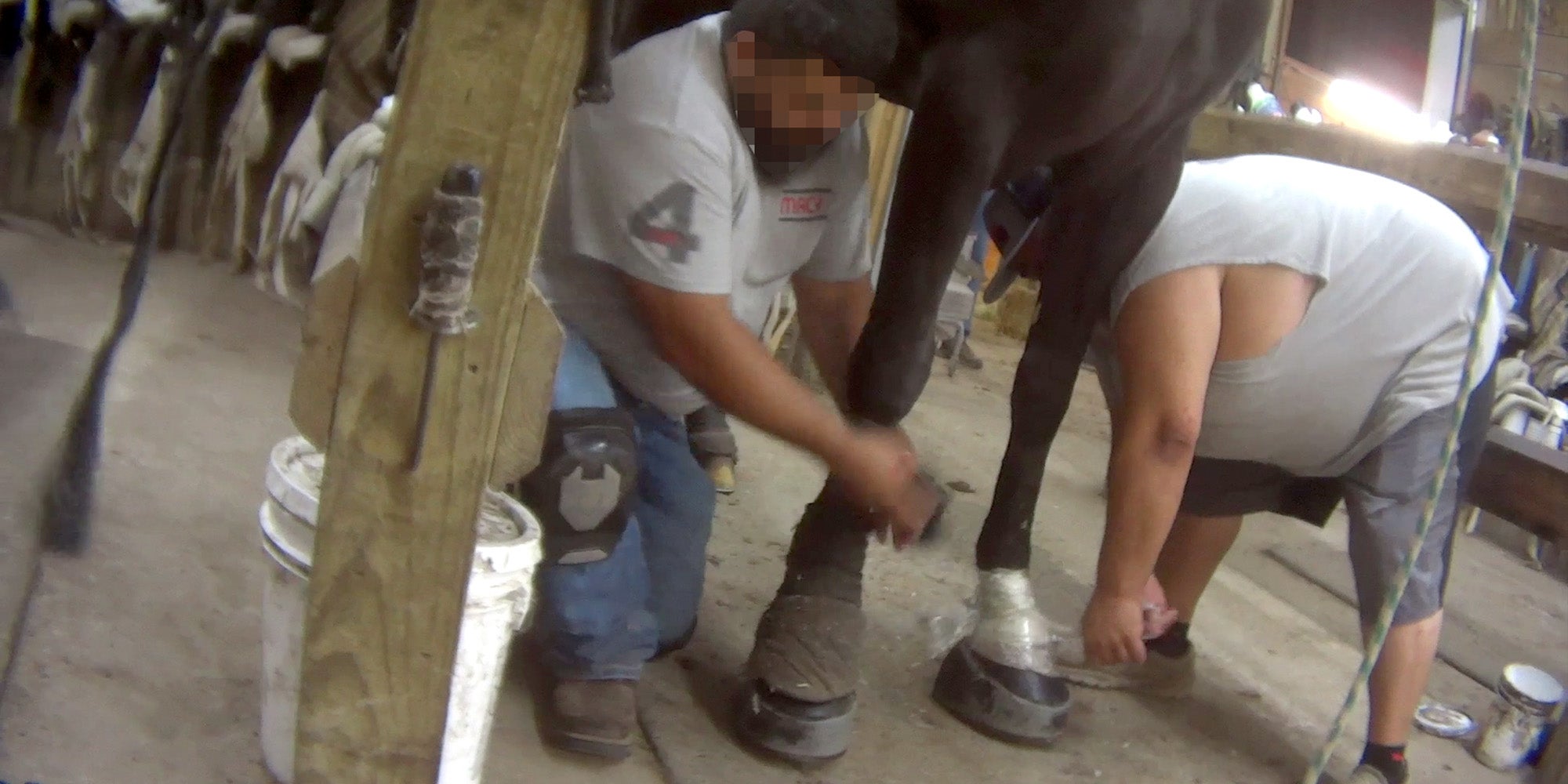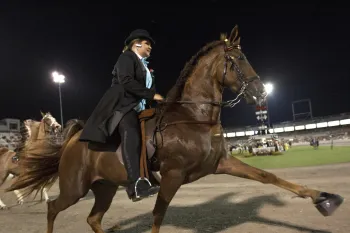She was just 6 or 7, but Jacqueline Graham knew something was wrong with the Walking Horse contests she competed in. She sensed the horses’ suffering as trainers prepared them to perform the exaggerated high-stepping gait called the “Big Lick,” putting their front hooves in tall stacks of pads and horseshoes and adding chains around their legs. Graham saw grooms apply liquids to horses’ legs and wrap them in plastic to soak in. It smelled like a factory or an auto shop—like diesel.
At age 12, Graham quit riding in Big Lick contests. Ten years later, in 2012, a trainer her family had known, Jackie McConnell, was exposed in one of our undercover investigations: Video showed staff “soring”—putting caustic chemicals on horses’ legs and beating them when they wouldn’t get up because of the pain.

Humane World for Animals
This past August, Graham attended The Celebration, the annual Big Lick championship in Shelbyville, Tennessee, for the first time since she was a child, to call for an end to horse soring.
“There’s bad training, and then there’s a sport that’s built on abuse that cannot exist without it; and Big Lick performance cannot exist without abuse and soring,” Graham says. “I was always told that’s how [the horses] walk. Now, I know there’s no way they do that naturally.”
Under the federal Horse Protection Act, showing a horse who has been sored is illegal, but loopholes allow abuse to continue, says Keith Dane, animal advocate and former senior director for equine protection at the Humane Society of the United States, now called Humane World for Animals. The Prevent All Soring Tactics Act would close the loopholes, eliminating industry self-policing, strengthening penalties and outlawing pads and chains. The House of Representatives passed the bill in 2019 and 2022. The Senate has not yet voted on it.
In May, after years of our lobbying and even suing the U.S. Department of Agriculture, the agency published a final rule to close the loopholes. Big Lick proponents filed a lawsuit to block the rule.
In October, we released results of an undercover investigation at a major, prize-winning Tennessee Walking Horse barn revealing that soring continues. Video footage showed staff applying corrosive substances such as kerosene, diesel and mustard oil to horses, wrapping and duct taping their lower legs so the solutions would cook in and injecting horses with medication to mask the pain so they could pass USDA inspections.
Graham is working to rally animal advocates to urge their legislators to support the PAST Act. As for those who attend The Celebration, she figures they keep letting it happen because it’s a “tradition.” No one talks about the cruelty. Her own parents have never admitted what took place in the barns when she was a girl.
“I asked them about it, and I was met with really no answer,” she says. “To this day, I still don’t have an answer.”
A cruel history
Soring is mainly practiced in the southeastern U.S. While Congress passed the first federal law against the practice 55 years ago, it has not been well enforced.
1950s Soring methods are developed by Tennessee trainers to incite an unnaturally high-stepping gait that attracts fans to Walking Horse competitions.
1970 The federal Horse Protection Act prohibits the showing, sale, auction, exhibition or transport of sored horses. Soring is defined as causing a horse pain in their lower legs by applying chemicals, using mechanical agents such as heavy chains or engaging in practices such as trimming hooves to expose sensitive tissue.
2013 Congress introduces the PAST Act to ban soring devices, replace industry self-policing with outside inspectors and strengthen penalties.
2017 The USDA publishes a rule to eliminate soring devices and end industry self-policing, but it is frozen by a new administration.
2024 The USDA publishes a new rule. The Celebration files a lawsuit.
2025 At the direction of the Trump administration, the USDA postpones the rule until Feb. 1, 2026.
Humane World for Animals/
Speak out to end cruel horse soring
No horse should be made to suffer for a blue ribbon. Help ban the use of devices integral to soring, strengthen penalties and make other reforms necessary to finally end this torture.

